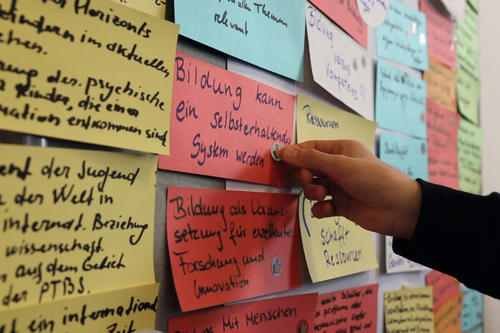Joint Research for a Liveable Future – How the Berlin University Alliance is making Civil Society a Stakeholder in the Next Grand Challenge
Weighted together: The topic of the Next Grand Challenge
Image Credit: FREIHEIT Gruppe Interdisziplinäre Medienproduktion GmbH
What do substitutes for plastic look like? How can we find ways out of the biodiversity crisis? And what can a building material made of fungi do? The inhabitants of Berlin have many ideas for excellent future research in the Berlin research hub. In the participation process for the Next Grand Challenge, the best one was determined.
"Your topic for Berlin's top-level research": Under this motto, the Berlin University Alliance called on civil society in July 2022 to participate in the selection of the Next Grand Challenge, the next major research program of the university alliance. And many responded to the call: Around 370 pupils, students, researchers, and stakeholders from business, politics, administration, and civil society worked out a total of 43 topic proposals in idea camps and workshops. In order to concretize and evaluate the topics, the BUA then invited all participants as well as other stakeholders from civil society, business, administration, and politics, a total of almost 140 people, to the Next Grand Challenge Forum. The enthusiasm of young people for science, a vibrant atmosphere full of networking and exchange, was palpable there. And so the participatory process for selecting the Next Grand Challenge at the BUA is considered a great success, because the suggestions of pupils and students brought scholars and scientists valuable new perspectives on their own research.
The result of the Next Grand Challenge Forum: five strong topic proposals for final selection in the Board of Directors, the governing body of the Berlin University Alliance, finally "Responsible Innovation in Times of Transformation". The research topic of the Next Grand Challenge of the Berlin University Alliance describes one of the central tasks of science for the coming years: finding solutions for sustainable technical and resilient social innovations for a future worth living in the face of human-induced climate change, in the age of the Anthropocene. And because scientific solutions have a greater chance of being implemented if they are created together with those affected, with stakeholders from civil society, the scientists will not work alone on the Next Grand Challenge but will incorporate knowledge and experience from civil society in order to actually create "Responsible Innovation in Times of Transformation". In this way, citizens, NGOs, and the Berlin administrations will be actively involved in the research process. In addition, the BUA partners have strong research partnerships with research institutions not affiliated with academia that are prominent in the Berlin research community, such as the Leibniz Association, the Max Planck Society, the Helmholtz Association and the Fraunhofer Society. They are all focused on helping the Next Grand Challenge succeed and on networking to jointly find answers to the major global challenges of the Anthropocene – supported by experts from the Berlin University Alliance and its integrated research environment. Experts such as Prof. Dr.-Ing. Christine Ahrend, a specialist in integrated transport planning, has long been involved in citizen participation and explains in an interview how participation in science can succeed.

